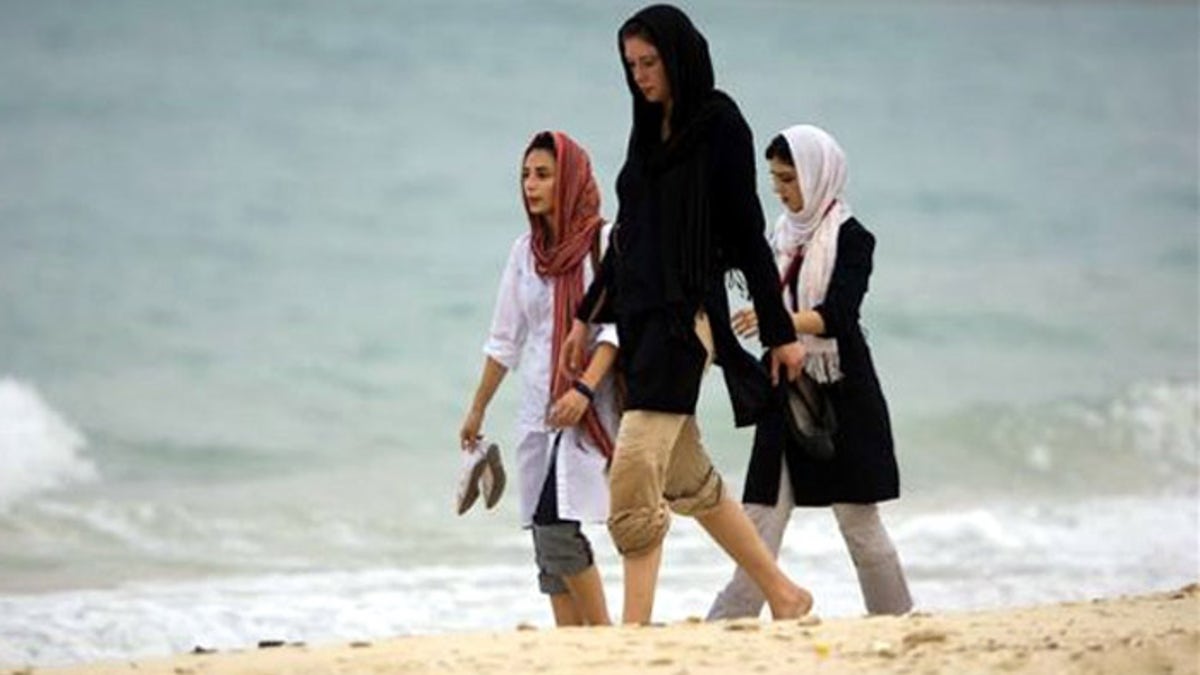
Iranian women walk along the southern beach on the island of Kish in the Persian Gulf, south of Tehran. (Reuters)
It’s not quite “I Love New York,” but there’s a new campaign under way to promote tourism to a location with culture, history and beaches galore.
The only problem is the pitchman is President Hassan Rouhani, and the location is Iran, where at least two Americans languish in prison on dubious charges and the authoritarian regime routinely threatens the West with noisy saber-rattling and a rogue nuclear weapons program. Still, Rouhani’s administration claims tourism is up 30 percent over a year ago, and is putting on a full-court press to double its annual number of visitors to 10 million.
[pullquote]
“There hasn't been a better time for Westerners to visit Iran since the 1979 revolution,” The U.K.’s Guardian gushed earlier this month, claiming the Islamic republic is now safer after “November’s historic nuclear agreement” between Iran and the P5+1 nations.
There’s no denying the natural beauty of the nation once known as Persia, with beaches on the Caspian Sea and Kish Islands, desert villages as old as civilization and some 16 sites listed on UNESCO’s World Heritage list. TripAdvisor.com lists such attractions as Tehran’s Treasury of National Gems, which is home to the world’s largest pink diamond, the 1,427-foot Milad Tower and the ancient desert city of Yazd as sites not to be missed.
Although direct flights between the U.S. and Iran haven’t taken off since 1979, when Iranian students took over the U.S. Embassy and held 52 Americans hostage for 444 days, travelers can connect flights in Istanbul. But they need a special visa and would have to ignore a warning from the State Department that “elements in Iran remain hostile to the United States,” and “U.S. citizens may be subject to harassment or arrest while traveling or residing in Iran.”
There are currently two American citizens being detained in Iranian prisons, former U.S. Marine Amir Hekmati, who was charged with spying after going to visit his grandfather, and Saeed Abedini, a Christian pastor from Idaho who was arrested for proselytizing when he went to his homeland to help build a secular orphanage. In addition, ex-FBI Agent Robert Levinson is believed to be held there, although the Iranian government denies it.
In 2009, three American hikers -- Sarah Shourd, Shane Bauer, and Joshua Fattal -- were detained for more than two years after allegedly hiking on the border with Iraq and accused of illegally entering Iran.
Abedini's wife, Naghmeh Abedini, blasted the campaign in a statement to FoxNews.com.
"Every time a tourist spends money in Iran, they directly or indirectly support the Revolutionary Guard and this radical government," she said.
The U.S. cut diplomatic ties with the Islamic Republic of Iran following the embassy takeover of 1979. Since then, the Swiss government has served as a protecting power for U.S. interests in Iran. Now, with a slight thawing in relations with the West, tour companies are trying to capitalize.
GeoEx, a San Francisco-based travel company specializing in travel to remote destinations, says it has seen a 160-percent growth in individuals traveling to Iran from 2012 to 2013, with more than four times as many people inquiring about Iran as a destination.
“Travel is a different kind of experience. It’s not about politics or war. It’s about the people, the art, the history, the culture, the food,” said Jean-Paul Tennant, CEO of GeoEx, who traveled to Iran in October. “If you had to pick one place where people fear traveling, but then they come back saying these are the friendliest people I have ever met.”
GeoEx, which, in 1993, became the first American tour company to send travelers into Iran after the 1979 Revolution, petitions for travelers’ visas and abides by Iran’s requirement to have all Americans travel with a government guide. Almost all of GeoEx’s clients have no problem getting visas, but if the traveler has previously visited Israel, they will not be let in, Tennant said.
Meanwhile, Rouhani’s administration has announced plans to ease visa requirements to help increase the number of visitors. Tourists from some Gulf countries could soon enter without a visa, and other travelers may be able to purchase a visa upon arrival in Iran.
Rouhani is also working on setting up direct flights between Iran and the U.S., Iranian news agency Tansim reported last September.
“It’s obvious when they come here that it’s not what they see in the news. They feel safe and love the people,” a hotel manager from the city of Tabriz, who did not want to be identified, told Fox News.
He said most of the travelers staying at his hotel are from Iraq, Turkey, China and different parts of Europe.
“The only problem they have is with the women’s hijab [a Muslim headscarf]. I see a lot of tourists, often European women, who complain about having to adhere to the strict dress code, especially during the summer.”








































